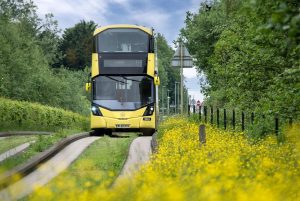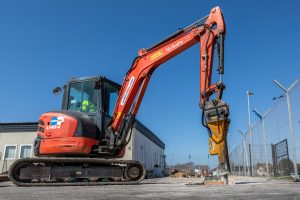Five-year review calls for significant public transport funding for Greater Manchester

Greater Manchester should get a share of £22bn of funding for major public transport schemes, a new report published today (October 18) says.
The National Infrastructure Commission has completed its second five-yearly National Infrastructure Assessment, which sets the agenda for the next 30 years.
Greater Manchester is one of four city regions identified for public transport improvements in the Government’s official infrastructure advisers’ latest report on the biggest priorities for the long term future of the country’s key networks.
The second National Infrastructure Assessment sets out a programme of transformation for the country’s energy, transport and other key networks over the next 30 years.
Its recommendations include giving Manchester a share of £22bn funding for major public transport schemes, with around two thirds of this investment focused on four priority city regions – Manchester, Birmingham, Bristol, and Leeds. The remaining one third should be allocated to other cities where a strong case can be made on the basis of connectivity or capacity, says the commission.
The Assessment points out how just 20% of Manchester’s population can currently reach the centre of the city by public transport within 30 minutes – something the Commission notes is worse than for many European cities of a comparable size.
It also sets out the scale of expected passenger demand growth in future, with an estimated capacity gap of at least 10,000 additional passengers unable to get into Manchester city centre during the midweek peak by 2055.
The Assessment says the scale of Manchester’s transport capacity need “is likely to justify investing in tram or rail-based projects, although the exact type and mix of projects is a decision for cities to determine with government based on the costs and benefits. Given major scheme lead-in times, project planning and business case development should proceed as soon as possible”.
The Commission suggests that the city regions benefiting from this transport investment should make a financial contribution of at least 15-25% of capital costs, and that a combination of mechanisms such as business rate retention and capture of land value increases should be considered.
Growing passenger capacity is best achieved by public transport, says the Commission, because it can convey commuters in a more space efficient way than cars, but this means peak time car travel will need to reduce in future to avoid congestion.
The Commission suggests that once public transport improvements offer commuters a viable alternative for getting in and out of the city centre, city regions will need to find ways of reduce peak time car journeys. The Commission is clear that “the exact form and sequencing of the demand management scheme should be a decision for the individual city”.
The Assessment also recognises the challenges cities face in maintaining transport services following the pandemic, and stresses that government’s immediate priority should be to continue to ensure financial sustainability of public transport services.
The report calls for “government [to] work with mayoral combined authorities to consider the long term sustainability and resilience of existing funding models for public transport systems, and the extent to which additional or new sources of funding will be necessary to secure this”.

HS2 train
Following government’s recent decision on High Speed 2 and noting the commitment to various new transport schemes, the Commission also calls for a new long term strategy that sets out how rail improvements will address the capacity and connectivity challenges facing the North and Midlands.
The Assessment proposes an urgent review of rail priorities for these regions, involving local leaders, to produce “a rigorously costed portfolio of schemes with clear delivery timescales”.
The report stresses the need to accelerate the roll-out of public charge points for electric vehicles to ensure that government’s expectation of 300,000 chargers by 2030 is met. This will require continued year-on-year grow of around 30% for the next seven years. The Commission notes the importance of ensuring public charge points are spread across all regions of the country, to support every driver in making the switch.
Sir John Armitt, chair of the National Infrastructure Commission, said: “Growing the size and productivity of Greater Manchester will help rebalance the country’s economic geography as well as create more well paid jobs locally.
“Better public transport and easing traffic congestion is key to that. Greater Manchester is one of four city regions with a clear case for significant government investment in a step change in transport capacity.”
He added: “While the way we travel around our big cities may change over time, keeping people moving affordably and efficiently is a key ingredient in economic growth and quality of life. Our recommendations to government set out a costed programme for delivering cleaner, faster travel, shaped by local leaders.”
Andy Burnham, Mayor of Greater Manchester, said: “I welcome the Commission’s latest assessment, which is a timely reminder of the need for a coherent, long term investment plan that is focused on delivering for our people, places and environment.
“If we are to deliver the revolution in transport, energy and housing that our residents deserve, then we need more powers and funding to unlock our growth and to deliver a carbon-neutral future. And it is good to hear the Commission once again advocating for both.”
He added: “The recommendations around capital and revenue funding support to improve public transport capacity in the North, but particularly in Greater Manchester, should be given serious consideration by the Government, if we truly want to deliver a fairer, greener and more connected country.”
The report draws on two years of analysis, expert engagement and public research, including a number of meetings with Greater Manchester Mayor Andy Burnham and local business leaders.
Ironically, following Prime Minister Rishi Sunak’s decision to axe the Northern phase of the HS2 project, the Assessment is upfront about the need for significant public and private investment in infrastructure if the UK is to rebalance its economic geography, meet climate obligations, improve resilience and enhance the natural environment.
Transport constitutes the largest proportion of government investment in economic infrastructure, and the Commission recommends that national spending should be held flat in real terms at an average of almost £28bn per year between 2025 and 2040.
This includes increasing investment in urban transport as a proportion of all transport spending from 40% in 2025 to 50% by 2040, reflecting the economic importance of cities, including a significant increase to fund the new public transport schemes in major cities.
The Assessment also sets out the likely impact of the Commission’s recommendations on households, where private investment is recouped through infrastructure service bills. It finds that the average household will save at least £1,000 per year by the mid 2030s compared with today, largely driven by the transition away from fossil fuels onto cheaper low carbon electricity.
Government is expected to respond formally to the Assessment within 12 months.








